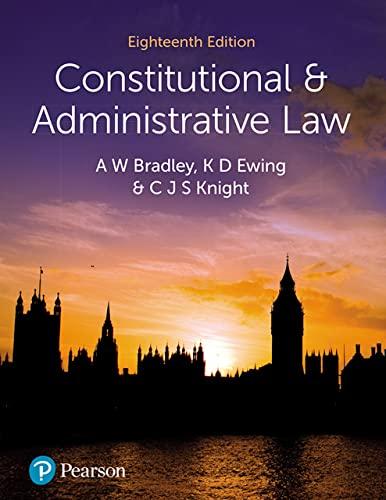Question
Please read this article War Clauses: Friend (not Foe) of Force Majeure Alert 26 August 2019 |5 min read Dr. Markus Burianski Christian M. Theissen
Please read this article
War Clauses: Friend (not Foe) of Force Majeure
Alert
26 August 2019
|5 min read
Dr. Markus Burianski
Christian M. Theissen
The Great Financial Crisis, natural disasters and political turmoil in various regions around the world have recently highlighted the significant importance of force majeure clauses. With regard to political turmoil, often leading to a deteriorating security situation, "war clauses" may be a more powerful tool to include in international agreements.
War clauses are a subset of force majeure. They may excuse a party's non-performance of its contractual obligations and justify early termination of a contract in the event of war. This article explains war clauses, examines their benefits and proposes useful drafting considerations.
Subset of Force Majeure
Typical war clauses require that a "war" "materially affects the performance" of the debtor. War clause is an umbrella term, which includes clauses titled, for example, "war risks", "outbreak of war" and "armed conflict". While these scenarios usually also fall within the ambit of force majeure clauses, three distinctive features separate a war clause from a force majeure clause.
Elimination of Ambiguity
Force majeure clauses often list events that are defined by abstract parameters. Issues can later arise as to what actually constitutes force majeure,1 whether the interpretation of these events is consistent with the applicable law governing the contract,2 or whether enumerated events additionally need to satisfy abstract criteria, such as "unforeseeability". This is exacerbated if boilerplate: "Acts of God" terminology is used, listing floods, fires, earthquakes and other analogous events as force majeure. If war ensues, does this mean the debtor is not entitled to invoke force majeure because it is a man-made event or because a war may have been foreseeable in that region of the world? A war clause removes this ambiguity and facilitates legal certainty in times of war.
Lower Causation Requirements
War clauses usually involve a lower causation threshold in comparison to force majeure clauses. Typical force majeure clauses require that the event "prevents performance". What this means is a matter of the applicable substantive law and may lead to a binary decision.3 By contrast, war clauses typically require that the war merely "materially affects" performance, which does not require that performance is prevented. This means that to rely on a war clause successfully and dispel contractual obligations, the relying party bears a less onerous burden. In other words, while war clauses apply only to a subset of force majeure events, once they apply, they facilitate access to the legal consequences.
Notification Requirement
Typical force majeure clauses require an aggrieved party to notify the other of the occurrence of a force majeure event preventing its performance. This may be justified because the event may be local and either its occurrence or its effects on performance may be unknown to the other party. War clauses usually do not contain a notification requirement, because it is assumed that the other party cannot be unaware of the relevant warlike developments.
Drafting Recommendations
If a war clause is potentially relevant, the following recommendations may be useful for parties considering whether to negotiate and draft a war clause into a future international agreement:
- Define war: Given the new forms of asymmetric warfare, to prevent any ambiguity, it is useful to clarify that it does not matter whether a state of war is officially declared or not and that a "war" may also be a civil war, invasion or military action by irregular fighters.
- Clarify that there is no need for the war to occur in the country of contractual performance. It may very well be that a war in neighboring countries A and B materially affects performance in country C.
- Avoid including negotiation attempts as a requirement to satisfy the war clause - such prerequisites are vague and hard to meet in war situations.
- Consider adding a provision regarding the economic consequence of relying on a war clause. What kind of compensation should a party that has partially performed the contract and then terminates because of war be entitled to?
- In the next decade(s), projects that affect national security directly (e.g. nuclear power plants) or indirectly (e.g. basic supply of drinking water or electricity) may be increasingly targeted by hackers. Therefore, if the project at issue could be materially affected by such acts of "cyberwarfare", these should be explicitly included to avoid ambiguity.
1) What is a necessary requirement to qualify for force majeure during war times?
2) What kind of compensation should a party that has partially performed the contract and then terminates because of war be entitled to?
Step by Step Solution
There are 3 Steps involved in it
Step: 1

Get Instant Access to Expert-Tailored Solutions
See step-by-step solutions with expert insights and AI powered tools for academic success
Step: 2

Step: 3

Ace Your Homework with AI
Get the answers you need in no time with our AI-driven, step-by-step assistance
Get Started


